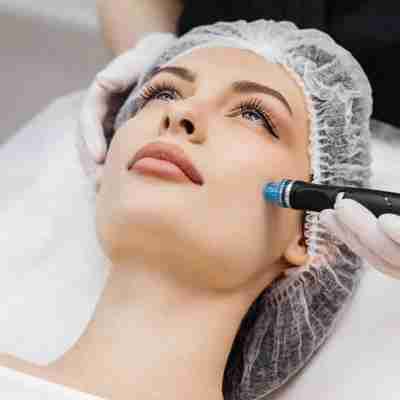The Ultimate Guide to Microneedling: Benefits, Process, and Aftercare
Microneedling, also known as collagen induction therapy, is a minimally invasive skin treatment that has surged in popularity due to its impressive results and minimal downtime. This procedure involves the use of fine needles to create tiny punctures in the skin, stimulating the body’s natural healing process and promoting the production of collagen and elastin. The outcome is smoother, firmer, and more youthful-looking skin. In this blog, we’ll explore the benefits, the detailed process, and essential aftercare tips for microneedling to help you decide if it’s the right treatment for you.
Benefits of Microneedling:
1. Reduces Fine Lines and Wrinkles:
Microneedling is renowned for its ability to diminish fine lines and wrinkles. By boosting collagen production, the treatment helps plump the skin, smoothing out these signs of aging.
2. Improves Skin Texture and Tone:
This procedure enhances the overall texture and tone of the skin. It effectively addresses rough patches, large pores, and uneven skin tone, leaving the complexion smoother and more uniform.
3. Minimizes Scarring:
Microneedling is particularly beneficial for reducing the appearance of acne scars and other types of scarring. The treatment promotes the production of new skin cells, which gradually diminish the visibility of scars.
4. Reduces Hyperpigmentation:
For those dealing with hyperpigmentation or sun damage, microneedling can be a game-changer. It encourages the turnover of skin cells, helping to fade dark spots and achieve a more even skin tone.
5. Enhances Skincare Product Absorption:
Post-treatment, the skin is more receptive to skincare products. The micro-channels created by the needles allow for deeper penetration of serums and moisturizers, enhancing their effectiveness.
The Microneedling Process:
1. Consultation:
The journey begins with a consultation with a licensed practitioner. They will evaluate your skin, discuss your concerns and goals, and determine if microneedling is suitable for you.
2. Preparation:
On the day of the procedure, your skin will be thoroughly cleansed. A topical numbing cream is applied to minimize discomfort during the treatment, which usually takes 20-30 minutes to take effect.
3. The Procedure:
During the session, the practitioner uses a dermaroller or a microneedling pen to create controlled micro-injuries in the skin. This process usually takes 30-60 minutes, depending on the area being treated. The device is moved systematically to ensure even coverage.
4. Post-Treatment:
Immediately after the procedure, your skin may appear red and feel like it has a mild sunburn. A soothing serum or mask is often applied to calm the skin and aid in the healing process.
Aftercare and Recovery:
Proper aftercare is vital for optimal results and smooth recovery. Here are key steps to follow:
1. Avoid Sun Exposure:
Post-treatment, your skin is more vulnerable to UV damage. Avoid direct sunlight and use a high-SPF sunscreen whenever you go outside. Wearing a wide-brimmed hat can provide additional protection.
2. Keep the Skin Hydrated:
Hydration is crucial. Use gentle, hydrating serums and moisturizers to keep your skin moist. Products with hyaluronic acid are particularly effective in retaining moisture and promoting healing.
3. Avoid Harsh Products:
Steer clear of products containing retinol, glycolic acid, or other harsh ingredients for at least a week after treatment, as they can irritate the skin.
4. Skip Makeup:
Avoid applying makeup for at least 24-48 hours to prevent clogging the micro-channels. When you do resume using makeup, ensure that your brushes and tools are clean to avoid introducing bacteria to your skin.
5. Follow Practitioner’s Advice:
Adhering to the specific aftercare instructions provided by your practitioner is essential for optimal results. They will offer tailored advice based on your skin type and the extent of your treatment.
6. Be Patient:
While some improvements may be visible within a week, the full benefits of microneedling typically emerge over several weeks as collagen production continues. Multiple sessions, usually spaced 4-6 weeks apart, may be recommended for best results.
Is Microneedling Right for You?
Microneedling is versatile and can address a wide range of skin concerns, but it’s not suitable for everyone. Individuals with active acne, eczema, rosacea, or psoriasis should avoid microneedling, as it could exacerbate these conditions. Those with a history of keloid scars or poor wound healing should also consider alternative treatments.
Consulting with a licensed and experienced practitioner is the first step in determining whether microneedling is appropriate for you. When performed correctly, microneedling can be an effective way to rejuvenate your skin, improving texture and addressing various skin issues.
Conclusion:
Microneedling offers numerous benefits, from reducing wrinkles and scars to improving skin texture and tone. By understanding the process and following proper aftercare, you can achieve remarkable results and enjoy healthier, more radiant skin. Whether you’re new to microneedling or considering it as part of your regular skincare routine, a consultation with a professional can help you embark on your journey to better skin with confidence. Embrace the transformative power of microneedling and let your natural beauty shine through.
https://www.dynamiclinic.com.p....oneedling-treatment/
